“Dear Editor,
Regrettably, the Government’s announcement on 10th September about the discontinuation of the University of Dublin (TCD) and National University of Ireland panels within the Seanad may not have caught everyone’s attention. This is primarily because it seemingly doesn’t affect most of the voting populace directly. However, for those who are heavily invested in the stability and future of our democracy, it is a matter of substantial importance.
The current system allows for the election of six Seanad members by graduates of Trinity and NUI. This is set to shift in the future, with graduates from all recognised third-level institutions being eligible to cast their votes. Initially, this appears to be fairer. However, the underlying consequence is a potential dilution of these six senators’ clout. This makes a mockery of Seanad reform and is nothing but a political ploy harnessed as a rung on the ladder to a Dáil election.
Nearly half a century ago in 1979, the electorate favoured change. Disappointingly, the enaction of this desired change is something we are still awaiting 45 years on. I find it utterly disgraceful that politicians, regardless of their political leaning, continue to postpone genuine reform of the Seanad. This reflects their vested interest in using the Upper House as a safety net for their political aspirations.
I recall with clarity my vote in 1979, calling for the expansion of the university senators’ election franchise. As a graduate of the Institute of Public Administration (prior to its NUI accreditation), I’ve not been entitled to participate in these elections. Interestingly, my daughter, who graduated last year from virtually the same course, will have voting privileges in the forthcoming election. Under the current process, it seems I will be kept waiting for an additional six years.
The frustrating fact remains that multiple governments have spent nearly 50 years disregarding popular opinion. It is hardly surprising that faith in politicians is at a low ebb.
Lastly, I welcome with open arms the merger and expansion of the two university Seanad panels. This overdue reform will greatly benefit disenfranchised Irish citizens living overseas.”
It’s noteworthy that Seanad elections, unlike Dáil and presidential elections, permit non-resident graduates to participate. Meticulous attention is paid to make overseas postal voting possible. The expanded university panel is expected to witness a surge in the diaspora electorate. This possibly accentuates the imbalances and unfairness in disallowing non-resident citizens to exercise their voting rights in Dáil and presidential elections.
Yours faithfully,
Ciarán Mac Guill,
Clichy, France.

